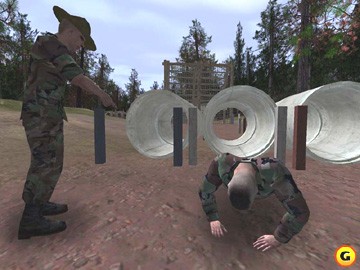
Military uses video game to recruit
Remember the days when Grandma reminded you ever so delicately that “life is a challenge, not a game”? Apparently the U.S. Army doesn’t buy it.
The Army has developed a computer game to attract recruits to what they see as one of life’s greatest challenges: military service. The game, called America’s Army, can be downloaded for free at www.americasarmy.com.
This new interactive game features first-hand combat simulation where the player can play alone or on the internet with hundreds of others already registered. The Army funnelled $7 million into the project. As a video game, it looks like money well spent.
There are plenty of different missions and landscapes to fight your way through. The attention to the details of combat is remarkable. It is harder to shoot your weapon while running. Even the breathing patterns of the soldiers that you control throw off the aim of the gun.
However, a bit more reality might have been appreciated in depictions of the gruesome acts of combat violence, especially if the intent is to sell people on a glorified version of a military scenario.
As a recruitment tool, the game is a success. If this game is anything like a true army experience, sign me up. Although it has received much positive support, some critics have argued that it is unethical to use violence as a recruitment tool.
“This is the military using military-themed games as a communication tool. That makes sense to me,” said corporate communications and public affairs professor Chris Anderson. “It’s not like the Girl Scouts are using it to target young kids. The audience is late teens and people in their early 20s.”
Anderson outlines three major benefits to using the video game as a public relations tool.
“The marketing people have a clear understanding,” Anderson says, “of (a) what they want to accomplish, (b) who their audience is, (c) and how they can relate to that audience. That’s textbook [public relations.]”
Although hard to measure the game’s effectiveness and whether it works or not, Anderson believes that the game will be a positive move for U.S. Army recruitment.
“It makes sense strategically. This is a tactic that their audience uses and enjoys, so clearly it’s target-relevant.,” he said. “I can’t say if it’s having an effect on numbers of new recruits, but certainly it’s effective in getting the Army onto the audience’s radar screen. That’s where it all begins.”









